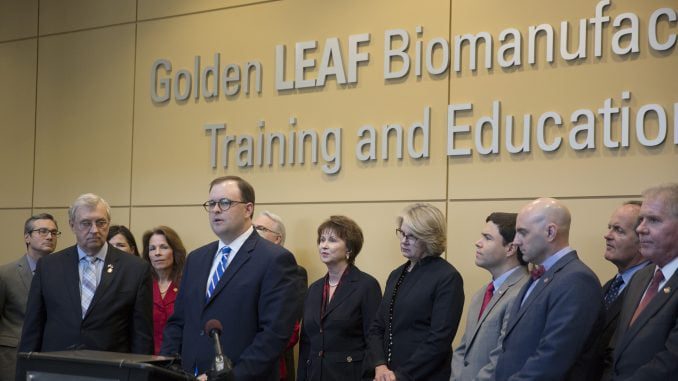
RALEIGH — The North Carolina Teaching Fellows Commission announced it selected five partner institutions this week based on legislative criteria and an applications process passed into law by the state legislature. The commission, and the revitalized program, were created in the 2017 State Budget.
The five partner schools — Elon University, Meredith College, NC State, UNC Chapel Hill and UNC Charlotte — will take part in a retooled Teaching Fellows program aimed at supporting students preparing for a teaching career in the fields of science, technology, engineering, math or special education.
The commission, formally appointed in September, is comprised of four deans from educator preparation programs, teachers, principals, a member from business and industry and a local school board member. The N.C. Teacher of the Year, Principal of the Year, Superintendent of the Year, chair of the State Education Assistance Authority (SEAA) Board of Directors, and director of the Teaching Fellows Program all serve as ex-officio members of the Commission.
In 2011, the N.C. General Assembly voted to end the NC Teaching Fellows Program. Since then, many on both sides of the aisle had called for the program to be reinstituted. In 2015, Rep. Susi Hamilton (D-New Hanover), who now serves as secretary of Natural and Cultural Resources, called for the program to be restored. “Rural areas experienced tremendous benefit from the state’s teaching fellow program,” said Hamilton, adding that the legislature should “return it for the welfare of the children of rural North Carolina.”
The last students from the former program graduated in the Spring of 2015.
Under the former program, students could select from 17 public and private N.C. institutions with teacher preparation programs and received annual forgivable loans of up to $6,500 per year. Students participating in the new program will receive up to $8,250 per year in forgivable loans if they commit to teach in a STEM or a special education area and attend one of the five partner institutions.
“We are thrilled that the state is re-establishing this critically important program and has selected Elon as a partner institution,” said Ann Bullock, dean of Elon’s School of Education and a member of the commission. “Alumni of our Teaching Fellows program are making an impact in the lives of children across the state and demonstrating the value of the state’s investment in their education.”
“Elon began the very first Teaching Fellows program at a private institution in North Carolina and has maintained a strong commitment to the program for more than two decades,” Deputy House Majority Leader Stephen Ross (R-Alamance), who represents Elon University, said in a statement congratulating the school.
The five institutions were selected based on criteria outlined in state law which included educator effectiveness, impact of alumni in STEM and special education, passage rates for required licensure exams and internship experiences for education students. The current legislative mandate will provide for about 160 future teachers each year.
“This new program will help recruit and retain high-quality teachers to areas of critical need in North Carolina,” said Junius Gonzales, UNC System senior vice president for academic affairs.
Teachers have 10 years to pay back the loan, either through cash repayment or loan forgiveness. In order to meet the loan forgiveness requirement, a teacher is required to serve one year in a low-performing school or two years in another public school for every year they were awarded a forgivable loan. Teachers who elect to work in public charter schools and University of North Carolina laboratory schools are eligible for the loan forgiveness.
Education program enrollment at UNC institutions dropped almost 30 percent from 2010 to 2015. However, from 2015 to 2016, enrollment increased by almost 6 percent with East Carolina — the top institution for total enrollment — growing by almost 600 students from 2015 to 2016.
“We are thrilled to be selected to participate in the North Carolina Teaching Fellows Program,” said Mary Ann Danowitz, dean of the NC State College of Education. “We are North Carolina’s largest producer of STEM educators, and the teachers we graduate are among the most effective in the state.”
The state budget bill, which included the new Teaching Fellows program, was vetoed by Gov. Roy Cooper, who said at the time of the veto that “this budget neglects our schools and our economy.” Cooper also said the budget failed “to fund promised teacher salary increases in future years, along with funding for early childhood education, community colleges and universities.”
The Republican-led General Assembly overrode the governor’s veto in early summer triggering reforms in teacher pay and kicking off the new Teaching Fellows program.
“The Teaching Fellows program is a key addition to our teacher appreciation agenda,” said Moore, who said the program was part of a broader commitment to education at the General Assembly. “Thanks to four consecutive pay raises for North Carolina teachers, the statewide average salary is $50,000 while starting teachers earn $35,000. This year, we had the fastest growing teacher pay in the nation since 2014.”
Applications for the program will be available in early December and the first new Teaching Fellows will hit campuses next fall.



